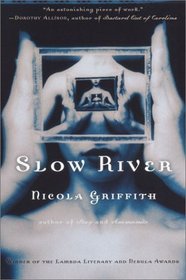Helpful Score: 1
This is a deeply impressive novel. It is exquisitely crafted: the pace is measured, but sure; the metaphors are used delicately; and the control over perspective (shifting between first person, tight third person, and loose present-tense third person for the three different timelines) is both absolute and absolutely necessary to the emotional arc being told. It is a novel to mull over, savor.
It is also an incredibly intense experience, or at least it was for me. I read it slowly partly so that I could admire Griffith's work, but mostly because reading it for more than half an hour at a time left me introspective and melancholy. There is a great deal of pain in the novel, and the carefully distanced prose makes it all the easier for the reader to fill in the blanks. For all the science fiction trappings (and they are many, from the cyberpunk-ish (but mostly irrelevant) identity hacking to the bioremediation science that furnishes much of the plot and much of the imagery) this story is about trauma, and surviving trauma, and then surviving your survival tactics. It's about ethics, and class, and identity, and monsters that come in human shape. It's vaguely dystopian without being political, and it's about corporate espionage while refusing to forget that corporations are anything but faceless.
I can't say I loved the book; it was far too emotionally hard for that. It left me unsettled and totally drained, and I don't know that I would ever read it again. But I will certainly be picking up everything else Griffith ever writes.
It is also an incredibly intense experience, or at least it was for me. I read it slowly partly so that I could admire Griffith's work, but mostly because reading it for more than half an hour at a time left me introspective and melancholy. There is a great deal of pain in the novel, and the carefully distanced prose makes it all the easier for the reader to fill in the blanks. For all the science fiction trappings (and they are many, from the cyberpunk-ish (but mostly irrelevant) identity hacking to the bioremediation science that furnishes much of the plot and much of the imagery) this story is about trauma, and surviving trauma, and then surviving your survival tactics. It's about ethics, and class, and identity, and monsters that come in human shape. It's vaguely dystopian without being political, and it's about corporate espionage while refusing to forget that corporations are anything but faceless.
I can't say I loved the book; it was far too emotionally hard for that. It left me unsettled and totally drained, and I don't know that I would ever read it again. But I will certainly be picking up everything else Griffith ever writes.
Helpful Score: 1
This gritty and beautiful book should become a cult classic if it is not already. The author does you the kindness of assuming you know how this future world works, and skips the nerdy explanations to jump right into an intriguing spy/detective story. Total immersion into a polluted future that is centered around the world's water supply, told from the perspective of a gay rich girl who is forced to become someone else. I am not sure I will swap this out before I read it another time.




